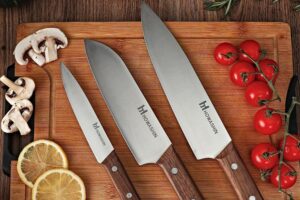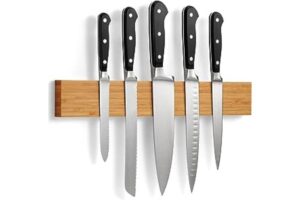A carbon steel knife is valuable for many cooking enthusiasts and professional chefs. It is the kitchen lover’s all-time favorite due to its marvelous sharpness, durability, and cutting performance.

In addition to it, the thin and lightweight design adds a stylish and innovative look.
It is also why many chefs and kitchen gurus will vouch for the precise and effortless slicing of this knife, such as slicing vegetables or filleting fish.
When taken care of, a carbon steel knife can last longer for years to come. In this article, we will explore how to care for and store your carbon steel knife to maintain long-term sharpness.
What Are Carbon Steel Knives Made Of?
What are carbon steel knives made of? Well, they are primarily made from a combination of iron and carbon, typically between 0.6% to 1.5%.
These knives are also known for their high carbon content, which is why they have distinguished hardness and sharpness compared to stainless steel knives.
On the other hand, they are also vulnerable to rusting and may require specific care so they will not rust easily.
Proper Care and Handling
Investing in high-quality steel knives is a smart choice, and caring for them is essential to prolong their quality. Carbon steel knives require regular maintenance to retain their sharpness, durability, and overall functionality.
Caring and proper handling are critical in keeping your knife’s quality high and making it lifelong. The following are the recommended things you should do to ensure appropriate care and handling:
Cleaning and Drying
After each use, cleaning your carbon steel knife properly is crucial. Remove any residue using a soft sponge or cloth and rinse it with water.
Do not use abrasive materials that can lead to scratching on the knife. Drying your knife with a clean towel will prevent moisture from causing rust.
Oiling and Seasoning
Applying a thin layer of food-grade mineral or knife oil after each use is recommended to prevent a carbon steel blade from rust. It helps create a protective barrier against moisture.
Additionally, some knife enthusiasts prefer to season their carbon steel knives by applying a thin layer of oil and heating the blade gently. This process enhances the knife’s performance and helps prevent rust.
Storing Properly
Proper storage is important for maintaining the condition of your carbon steel knife. Avoid storing it in a humid environment or damp, which can promote rust formation.
Ideally, keep the knife in a knife block, on a magnetic strip, or in a knife sheath to prevent accidental damage or protect the blade.
Sharpening and Honing

Regular sharpening and honing are crucial for keeping your carbon steel knife in optimal cutting condition. You may use a sharpening stone or homing rod to maintain your knife’s sharpness.
Sharpening the knife at least once every few months or even as necessary will keep its quality.
Avoiding Acidic Foods
Carbon steel knives are more reactive to acidic foods like citrus fruits and tomatoes. It is advisable to avoid prolonged contact between the blade and acidic ingredients to prevent discoloration or corrosion.
After using the knife with acidic foods, clean and dry it promptly to minimize the risk of damage.
Professional Maintenance
It is best to seek professional assistance if you need clarification on maintaining your carbon steel knife or encounter any significant issues.
Professional knife sharpening services can help restore the knife’s edge and address specific concerns.
What Will Happen if Carbon Steel Knives Are Not Taken Properly?
If steel knives are not taken care of properly, several issues can arise that can affect their performance longevity and even pose safety risks. Here are some potential consequences of neglecting proper care for steel knives:
1. Dullness
Without regular maintenance, carbon steel knives can become dull over time. Dull knives make cutting and slicing more challenging, requiring more force and increasing the risk of accidents.
Worn blades can also damage food, resulting in uneven cuts and affecting the overall presentation of your dishes.
2. Rust and Corrosion
Steel knives, mainly carbon steel ones, are susceptible to rust and corrosion if not dried and stored correctly. Exposure to moisture can cause the blades to develop rust spots, compromising their integrity and hygiene.
Rust can also affect the taste and appearance of food, making it unsuitable for consumption.
3. Increased Risk of Accidents
Neglected steel knives with dull blades can slip or skid during use, leading to accidental cuts and injuries. A lack of proper care can also result in loose or damaged handles, increasing the risk of accidents while handling the knife.
4. Reduced Lifespan
If handled properly, the quality of the knife will be maintained, leading to a shortened lifespan. The improper use may cause irreversible damage to the blade, handle, or other components, making it unusable.
If that happens, this can lead to replacement, which will be costly and inconvenient.
5. Poor Performance
When steel knives are adequately cared for, their overall performance could improve. Dull blades and compromised sharpness can make cutting tasks more difficult and time-consuming.
It can affect the efficiency and precision required in the kitchen, hindering your cooking experience.
Proper Way to Storing Your Carbon Steel Knives
Proper storage is crucial to prevent rust and corrosion on steel knives. Here are some recommendations for storing steel knives to maintain their condition:
Knife Block
Using a knife block is a popular and effective way to store steel knives. Knife blocks have slots that can hold your knife securely, minimizing the risk of misplacing them.
It will keep the blades upright and separated to prevent them from rubbing against each other. It will keep your knife from being prone to dulling.
Magnetic Knife Strip

Another option is to store steel knives on a magnetic knife strip. These strips have a magnetic surface that holds the knives in place.
It allows the blades to be exposed, which helps them dry faster and lessens the risk of moisture accumulation. Ensure the magnetic strip is mounted securely on a wall or another suitable surface.
Knife Drawer Inserts
Consider using knife drawer inserts or knife guards if you prefer to keep your knives in a drawer.
These inserts have individual slots or compartments that hold each knife securely, preventing them from rubbing against each other and lessening the risk of damage and corrosion.
Make sure the drawer is clean, dry, and free from moisture.
Knife Sheaths or Blade Guards
Make sure to use knife sheaths or blade guards for additional protection for your knife. Using these covers provides a physical barrier that prevents the knife from coming into contact with moisture.
In addition to that, before keeping the blade, check if it’s clean and dry.
Avoiding Humid Environments
Storing steel knives in a dry environment is essential to prevent rust and corrosion. Avoid storing them in humid areas such as near sinks, dishwashers, or moisture-prone areas.
If you live in a particularly humid climate, consider using a dehumidifier in your kitchen to minimize moisture levels.
Always dry your knives thoroughly before storing them to prevent any residual moisture from causing rust or corrosion. Regularly inspect your storage method to ensure it remains clean and dry.
By following these storage recommendations, you can help preserve the quality and condition of your steel knives, minimizing the risk of rust and corrosion.
Conclusion
Caring for your carbon steel knife is essential to preserve its performance, sharpness, and longevity.
Consider following these guidelines of proper cleaning, drying, oiling, storing, sharpening, and avoiding prolonged exposure to acidic foods.
You can ensure that your carbon steel knife remains a reliable and cherished tool in your kitchen.
Remember, each carbon steel knife may have specific care requirements, so always refer to the manufacturer’s instructions and recommendations.
With the right care and maintenance, your carbon steel knife will continue to serve you well, making your culinary experiences even more pleasurable.
Taking care of your carbon steel knife is like caring for one of your valuable belongings. You want them to work efficiently and last longer in everyday use.
